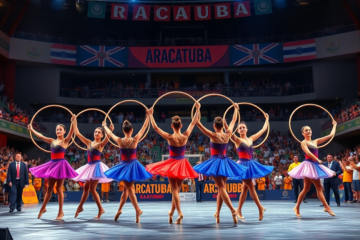The Whistle Mafia and Fraud in Football
Football Fraud have been a controversial and worrying topic in the Brazilian sports scene.
In this article, we will explore the match-fixing scandal that unfolded in 2005, revealing collusion between referees and bettors.
We will analyze the immediate consequences of the case, the gaps in criminal penalties, and the evolution of legislation since 2010. We will also discuss recent investigations that indicate the persistence of fraud in football and how the current legal framework seeks to respond to these illicit practices.
This event became a landmark in the history of Brazilian sports, influencing the way fraud is treated today.
Revelation of the Scandal in 2005
In September 2005, the revelation of the scandal known as Whistle Mafia caused a significant shock to Brazilian football and the national media.
Detailed reports have exposed a sophisticated scheme of manipulation of results involving referees and bettors, exposing a reality that had previously been hidden under the spotlight of sport.
The press, as the driving force behind this revelation, brought to light information that had a profound impact on credibility of competitions, leading to an unprecedented crisis of confidence on and off the pitch.
The broadcast of these events created an immediate state of shock, forcing managers, fans and athletes to reevaluate their beliefs about the integrity of football matches.
The consequences were profound and long-lasting, resulting in heated debates about the need for structural reforms in sports institutions.
- Exposure of referees involved
- Immediate reaction from the fans
- Impact on the credibility of competitions
Connection between Referees and Bettors
In the "Whistle Mafia," the collusion between referees and bettors operated in a meticulous and strategically orchestrated manner. Referees like Edilson Pereira de Carvalho, banned from football for his participation in the scheme, were approached by bettors seeking to manipulate results to make substantial profits.
In this scheme, referees were instructed to influence matches through controversial decisions on the field, ensuring the accuracy of previously agreed scores and favoring specific bets.
To learn more about how this scheme affected football, you can watch the documentary “Whistle Mafia” that explores the behind-the-scenes of this monumental scandal.
One notorious example involved the intentional awarding of “non-existent penalties,” which significantly altered the course of games.
Furthermore, these referees unjustifiably increased the “time extensions”, allowing more opportunities for manipulation of the final result.
Such methods were executed with precision, taking advantage of loopholes in the sports regulations of the time, which was less robust in relation to sports fraud.
The devastating impact of these actions not only undermined confidence in Brazilian football, but also highlighted the need for stronger legislation to combat this type of crime.
With the advent of investigations and intense media coverage, the “members of the Whistle Mafia” were exposed, resulting in significant changes to Brazilian sports legislation.
However, the memory of this scandal remains as a constant warning about the risks of corruption in sport.
This resulted in the creation of stricter laws, culminating in a restructuring that seeks to protect the integrity of sporting events.
“
Sanctions and Prescription of Crimes
After the scandal of Whistle Mafia, immediate actions aimed at the integrity of the sport.
The referees involved were expelled from the CBF, ensuring that they no longer participated in official football competitions.
At the same time, the mastermind behind the scheme was arrested, highlighting the seriousness of the investigations being conducted.
Despite these initial actions, procedural deadlines resulted in the lack of criminal punishments definitive, raising concerns about the effectiveness of the legal system at the time.
As mentioned in the sentence, many cases have expired, frustrating investigators and the public.
The main sanctions include:
- Permanent expulsion of CBF referees
- Arrest of the scheme's mastermind
- Cancellation of tampered matches
- Adoption of new, stricter rules against sports fraud
With the update of the laws in 2010, it is expected that similar events will be treated with greater legal rigor in the future.
Improvement of Legislation After 2010
The 2005 Whistle Mafia scandal revealed to the public the vulnerability of sports legislation Brazilian society in the face of fraud, generating pressure for legal changes.
Since then, legislation has evolved with the improvement of standards which now provide for up to six years of imprisonment for crimes of match-fixing.
The introduction of mechanisms such as award-winning collaboration and the strengthening of financial monitoring aims to effectively prevent fraud.
| Before 2010 | After 2010 |
|---|---|
| Up to 2 years of detention, without specific classification | Imprisonment of up to 6 years with clear typification |
| Lack of appropriate investigation mechanisms | Award-winning collaboration and financial monitoring |
From 2010 onwards, the legislation began to incorporate more stringent provisions, according to the CPI's findings, which highlight the need for effective punishments and planning in investigations.
These advances are facilitated by reforms in General Sports Law, as discussed in proposals contemplating even more severe and comprehensive penalties.
Recent Investigations and Effectiveness of the Law
Investigations into fraud in Brazilian football since 2020 show a significant evolution in the legal response to match-fixing, reflecting the legacy of Whistle Mafia.
The Federal Police and the Public Prosecutor's Office, supported by current legislation, have carried out operations that have resulted in arrests and seizures, demonstrating a more effective approach than in the past.
To the strengthened legal mechanisms, such as international cooperation and leniency agreements, are fundamental.
Through this, Brazil is able to collaborate with countries where betting platforms are located, ensuring a more efficient exchange of crucial information.
If previously those involved escaped unharmed due to legal loopholes, they now face harsher penalties, creating a deterrent effect.
However, challenges persist; the rapid evolution of technology and the creativity of offenders require constant updating of combat mechanisms.
Thus, although the legal response has evolved, the total eradication of fraud remains an objective to be achieved.
In short, the 2005 scandal and its consequences shaped sports legislation in Brazil, making it more rigorous.
The fight against football fraud continues, but now with a stronger legal basis to deal with these crimes.



0 Comments